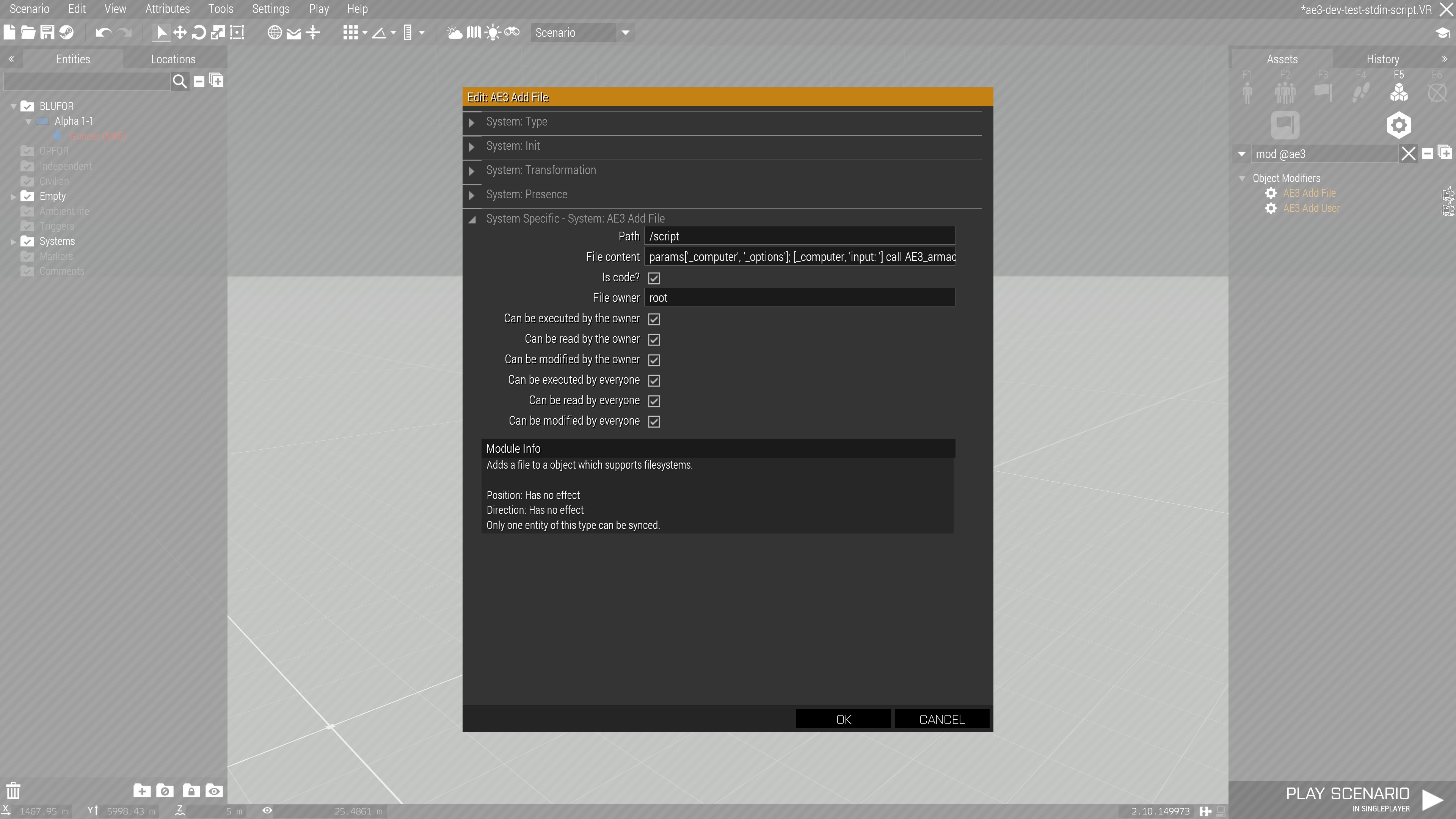-
-
Notifications
You must be signed in to change notification settings - Fork 10
Write your own armaOS application
If you add a file to a computer via the addFile module, you will be able to flag that file as code. Now you can set the file input to something like this. This example takes a user text input and uses the Arma 3 hint command to display a notification with that custom text.
You can stop every running, active program or command by pressing CTRL+C
params["_computer", "_options", "_commandName"];
[_computer, "input: "] call AE3_armaos_fnc_shell_stdout;
output = [_computer] call AE3_armaos_fnc_shell_stdin; hint output;
In Arma you can execute the file like in this screenshot.

Using of the armaOS options and arguments parser, called getOpts, it completely optional. You can always parse the options and arguments by yourself. The _options of your command function is an array of strings containing all options and arguments and anything else. It is created via _commandString splitString " ". The first element is always the command name itself and is stored in _commandName. The rest is stored in the _options array of strings.
First of all you need to define an settings array for the allowed options, See example. Each inner array defines one option.
| index | config value | description | required |
|---|---|---|---|
| 0 | var name | this is the name of the returned variable that stores the value, should start with _ for private variables |
yes |
| 1 | short | the short option, like l, only single characters are allowed; can be set to "" if only long option is used; don't put - at the beginning |
yes |
| 2 | long | the long option, like long, only multiple characters are allowed; can be set to "" if only short option is used; don't put -- at the beginning |
yes |
| 3 | type | see list below | yes |
| 4 | default | should be set to something, if the opt/arg is not required, so it can be initialized with default value; otherwise set to ""
|
|
| 5 | required |
true or false
|
yes |
| 6 | help | a string describing the opt/arg; used for help | yes |
| 7 | allowed values | mandatory only if a select-type is used, like stringSelect or numberSelect | no |
| opt/arg type | description |
|---|---|
| bool | if set then it's true else it's false
|
| string | everything after the = sign as string |
| number | everything after the = converted to a number with parseNumber
|
| stringSelect | like "string" but needs to be out of predefined list, see index 7 of opt/arg config |
| numberSelect | like "number" but needs to be out of predefined list, see index 7 of opt/arg config |
| file | like "string", only for organizational purposes |
| folder | like "string", only for organizational purposes |
| fileExist | like "string", but also checked if this file exists (no check if it's file or folder) |
| fileNonExist | like "string", but also checked if this file does not exists (no check if it's file or folder) |
| folderExist | like "string", but also checked if this folder exists (no check if it's file or folder) |
| folderNonExist | like "string", but also checked if this folder exists (no check if it's file or folder) |
private _commandOpts =
[
["_longOutput", "l", "long", "bool", false, false, "prints long output format, containing permissions and owner"],
["_humanReadable", "h", "human-readable", "bool", false, false, "converts bytes into kbytes, Mbytes and so on"],
["_width", "w", "width", "number", 5, false, "sets the width of ..."],
["_comment", "c", "comment", "string", "", false, "prints things you want to say"],
["_mode", "m", "mode", "stringSelect", "", true, "sets the mode", ["encode", "decode"]],
["_algorithm", "a", "algorithm", "stringSelect", "", true, "sets the algorithm", ["caesar"]],
["_delay", "", "delay", "numberSelect", "1", false, "sets the delay in seconds", [1, 3, 5]],
["_experimental1", "x", "", "bool", false, false, "example for an option with only short version"],
["_experimental2", "", "exp", "bool", false, false, "example for an option with only long version"],
["_file1", "", "file1", "file", "/var/obj1", false, "sets a file"],
["_folder1", "", "folder1", "folder", "/var/", false, "sets a folder"],
["_inFile", "i", "input", "fileExist", "", true, "sets the input file"],
["_outFile", "o", "output", "fileNonExist", "", true, "sets the output file"],
["_inFolder", "s", "source", "folderExist", "", true, "sets the source folder"],
["_outFolder", "d", "destination", "folderNonExist", "", true, "sets the destination folder"]
];Next you need to define the syntax. The syntax is checked and used to display the allowed syntax variants when using the -h/--help option. Syntax is also defined in an array containing syntax variants. Each syntax variant contains the following elements:
- "command" (mandatory) : the command itself; simply use the settings from the example; there is no need to modify that
- "options" (optional) : if set, the syntax shows that there are options available to use
- "anything" (optional) : if set, this syntax element stands for something else, that is needed, like a string, filepath, ip address etc. You can have multiple of these
The third element is the "required" flag:
If you set the "required" flag to false, the element is eclosed in brackets [] to indicate, that it is optional. If set to true, the syntax check expects to find 1 element.
The fourth element is the "unlimited" flag:
If you set the "unlimited" flag to true, three dots ... will be appended to the element, to indicate, that you can use multiple of these elements in your command. If set to true, the syntax check expects to find 0 or more elements. If "required" is set to true, the syntax check expects 1 or more elements.
private _commandSyntax =
[
[
["command", "test", true, false],
["options", "OPTION", false, false],
["path", "PATH", true, false]
],
[
["command", "test", true, false],
["options", "OPTION", false, false],
["path", "PATH1", true, false],
["path", "PATH2", true, false]
],
[
["command", "test", true, false],
["options", "OPTION", false, false],
["path", "PATH", true, true]
]
];Now you only need to combine the command name with the two settings arrays and give these settings to the getOpts function, see example. By processing the results directly via the params command, all needed private variables are initialized.
Also there are two additional variables called _ae3OptsSuccess and _ae3OptsThings. _ae3OptsSuccess is true if everything went well while parsing the options and arguments. It becomes false if, for example, a required option is missing.
_ae3OptsThings is an array of all elements after the options block. This is what you need to process yourself.
private _commandSettings = [_commandName, _commandOpts, _commandSyntax];
[] params ([_computer, _options, _commandSettings] call AE3_armaos_fnc_shell_getOpts);
if (_ae3OptsSuccess) then
{
{
private _somethingString = format ["Something %1: %2", _forEachIndex, _x];
[_computer, _somethingString] call AE3_armaos_fnc_shell_stdout;
} forEach _ae3OptsThings;
};You will find some useful examples on my Discord in the Channel #ae3-code-examples